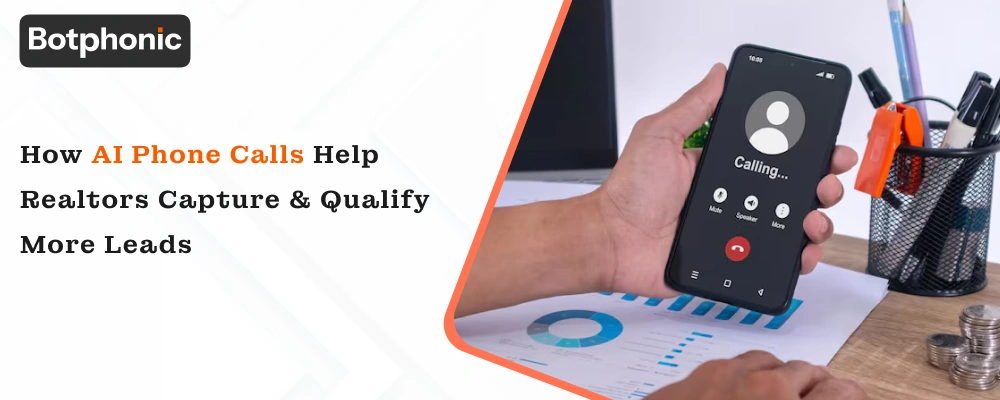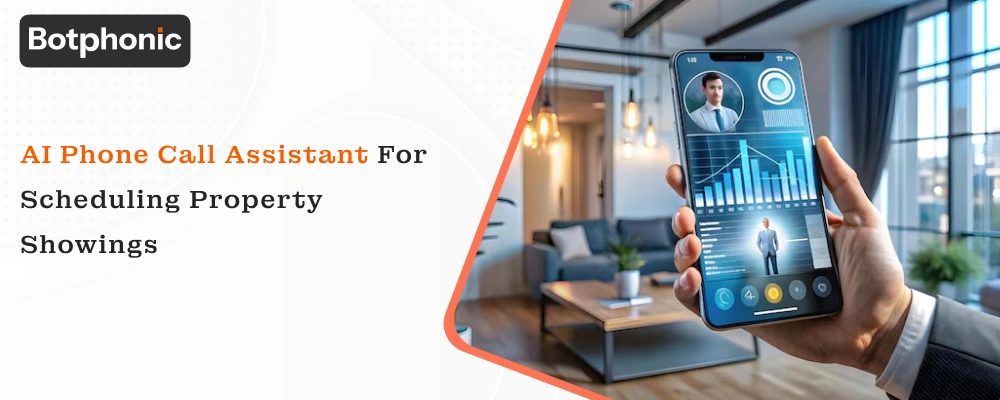
Summarize Content With:
Summary
This blog discusses how the use of an AI-supported phone call assistant can radically change the way property showing appointments are scheduled, the reasons why real estate agents adopt this technology and the means of implementing it efficiently, utilising Botphonic.ai. We will also pit competitors against each other and feature key points, best practices, and ROI measures.
Key takeaways
- An AI phone call assistant for property showings is something you will grasp after reading the article and understanding why it is significant.
- You will discover how it enhances lead response time, lowers the rate of no-shows, and releases agents for other tasks.
- With the help of Botphonic.ai, you’ll be able to put in place some practical implementation methods for such a tool and also get your work calendars/CRMs set up for seamless integration.
- One can learn to gauge the effectiveness of the work done and thus determine the most suitable provider while simultaneously averting the general difficulties that usually accompany implementation.
Introduction
Suppose it is 10 pm, and a promising lead comes your way. The client needs to see a house first thing in the morning. It’s your phone that is ringing. Obviously, you are elsewhere, carrying out an eye-opening at another property. So, what will it be? Will you allow the call to be diverted to voicemail, thereby risking the possibility of losing the lead? Or are you going to accept the challenge of juggling your appointments while still being able to attend to several listings?
The real estate market changes very quickly, and it is necessary to save time. That is exactly why an AI phone call assistant for property showings is the right choice to make the first contact, arrange the visit, verify the appointment, and even merge it into your calendar; thus, you ensure not to lose the lead. We will explore what this assistant is capable of, how it operates, why it is a groundbreaking tool for real estate agents, how to deploy it with Botphonic.ai, and how to evaluate the impact in this article.
Why Real Estate Professionals Need It Now
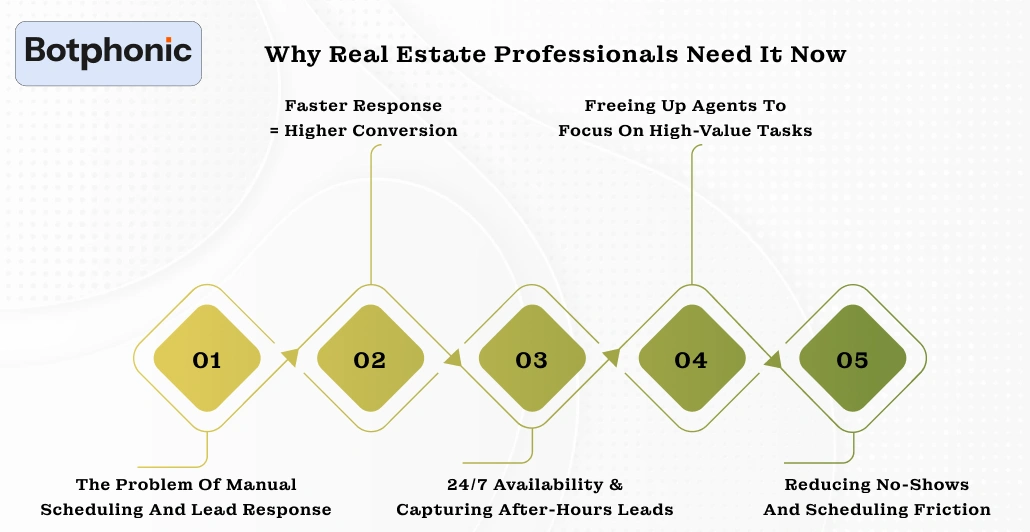
1. The problem of manual scheduling and lead response
Realtors are always getting interrupted. The telephone rings; voicemail piles up. Manual scheduling gets in the way of prioritisation, leads to double bookings, and ultimately leads to missed opportunities. Responses that come too late often result in lost deals. A certain blog stated that “real estate agents remain mostly on the phone; property showings and scheduling are among the main discomforts.”
2. Faster response = higher conversion
Research has shown that the instant conversion of leads via telephonic contact has a significant impact on the number of sales made. Although a precise number for showings is not easy to find, one message says that “use of AI voice agents in real estate has resulted in a 35% increase in conversion rates.”
3. 24/7 availability & capturing after-hours leads
People viewing properties may do it at night and then call to inquire. If your business hours are 9 to 5, you will not be able to convert these leads. AI call assistant are available 24/7, handling incoming calls, arranging appointments, and taking down messages.
4. Freeing up agents to focus on high-value tasks
In case a machine takes care of the planning and confirmations, representatives can go ahead and use their time in exhibiting properties, negotiating, and sealing deals. Hence, a lesser amount of time is utilised on administrative tasks while more hours are engaged in revenue-generating activities.
5. Reducing no-shows and scheduling friction
No-shows occur when there is an improper booking of showings or reminders are not sent. AI can help eliminate the problem of no-shows by sending reminders, requesting confirmations, and reducing friction.
Leads are not going to wait for you; they move very fast. Your AI assistant must be ready to respond instantly when your phone rings.
With Botphonic.ai, you are able to seize every opportunity, scheduling is automated, and clients get impressed 24/7.
Schedule your personalised demo today and discover how effortlessly you can change your property-showing process with AI.
Try it Now!How It Works: Behind the Scenes of the AI Assistant
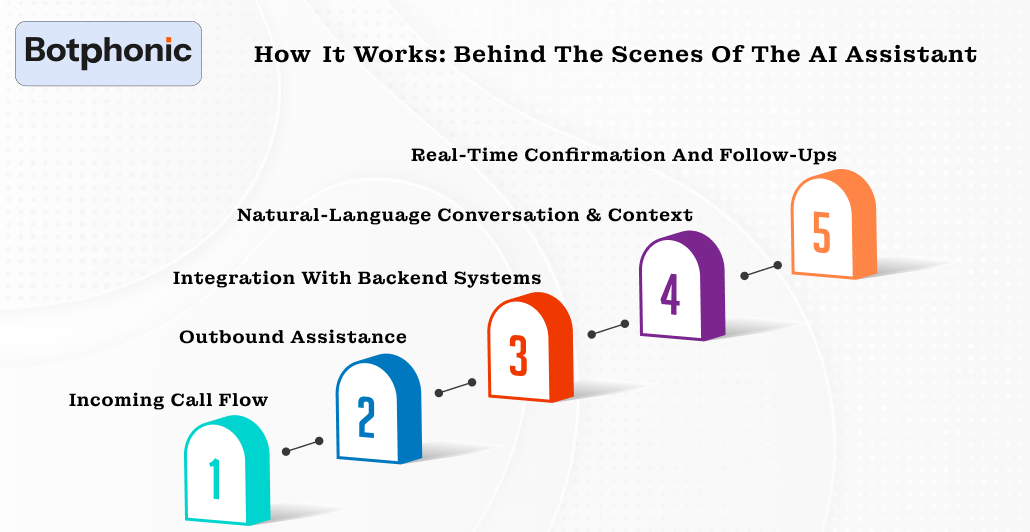
1. Incoming call flow
- A potential buyer or renter dials the number of the property that is for sale.
- The AI picks up immediately (“Hello, thanks for calling XYZ Realty…”).
- Through the phone exchange, it gathers information on the budget, timeframe, and property of interest.
- Through an integration (e.g., Google Calendar, ShowingTime), it verifies whether the agent or location is available.
- It provides the time slots, shows if necessary, and sends the confirmation via SMS/email.
2. Outbound assistance (optional)
The AI assistant can offer voice calling services to follow up on leads, as well as help with scheduling, placing the calls in advance, or handling reminders.
3. Integration with backend systems
The AI can communicate with your calendar, CRM, property listing database and it can also send the confirmations and reminders without any intervention from you. Integration is the pivotal element here. Source: “AI voice agents and real estate auto dialer … schedule property showings … with calendar sync”
4. Natural-language conversation & context
Current assistants rely on conversational AI along with context memory (thus the caller does not have to repeat the preferences). One blog refers to modules such as memory/context, NLP, and task execution.
5. Real-time confirmation and follow-ups
The AI sends reminders (e.g., 24 and 2 hours before) after the appointment is made and possibly a follow-up call/text after the showing to gather feedback from the client.
Core Features to Look For (and How Botphonic.ai Delivers)
| Feature | Why It Matters |
| 24/7 inbound call handling | Ensures leads are captured any time |
| Natural-language conversation | Appears human, builds trust |
| Calendar & showing slot integration | Avoids double-booking; instant scheduling |
| Lead qualification questions | Focuses on serious prospects |
| Confirmation & reminder messages | Reduces no-shows |
| CRM & property-database sync | Keeps records accurate and workflows smooth |
| Reporting & analytics | Allows measurement of performance |
Learn more: How to Set Up AI Phone Calls in 5 Simple Steps
Implementation Steps: From Setup to Go-Live
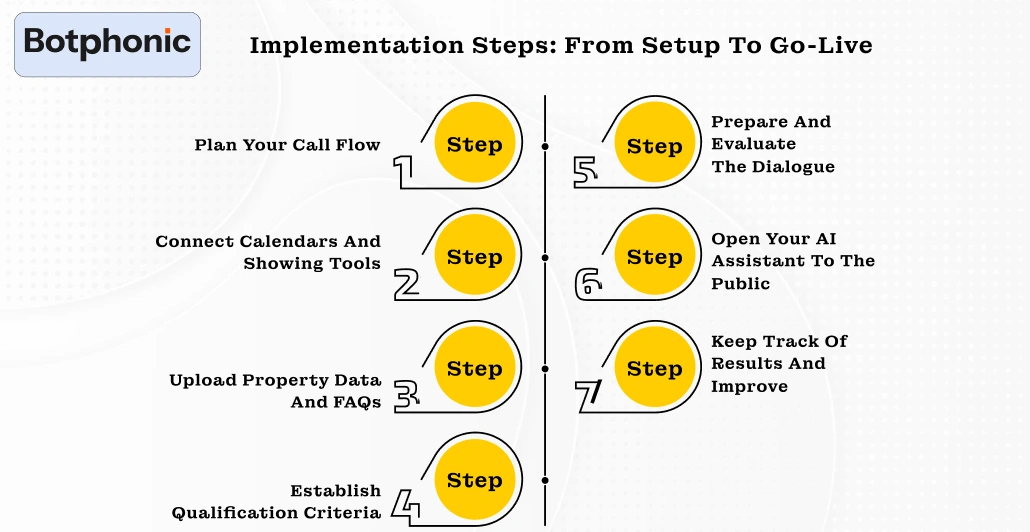
Setting up an AI phone call assistant for property showings may sound very technical, but with the right platform, like Botphonic.ai, it’s actually quite straightforward. Consequently, you can go from the concept to the actual implementation in just a handful of steps. Each stage helps you develop a clever, natural, and time-saving scheduling assistant that integrates seamlessly with your workflow.
Step 1: Plan your call flow
To begin, think through what tasks the AI assistant has to perform for you on every call.
Write down all the different kinds of requests a caller might have; for instance:
“I want to schedule a showing.”
“Can I reschedule my appointment?”
“Tell me more about this property.”
Afterward, prepare how the assistant will help the interaction move forward. Chart out the greetings, questions, and answers. Having a thoroughly worked-out plan ensures that every caller receives a seamless experience from the assistant while also providing the most important information, such as date, time, and contact details.
Step 2: Connect calendars and showing tools
Afterwards, connect your assistant to the tools you already use. In other words, you need to integrate your Google Calendar, Outlook, or ShowingTime account. By doing this, the AI will be able to check the available slots very quickly and if it is free, it will book without the possibility of a conflict.
Simply put, with Botphonic.ai, you can affect these integrations in just a few clicks. As a result, this linking prevents double-bookings and is of great use in saving you the time that would otherwise be spent on manual scheduling.
Step 3: Upload property data and FAQs
Your assistant must be equipped with the essentials of the property, i.e., the address, price, features, and FAQ. So, if the caller inquires, “Is this property pet-friendly?” or “How many bedrooms?”, the assistant must be the one to provide the answer. The data provided must be accurate to avoid confusing the assistant. The assistant should be able to sound like an expert, and thus, customers should feel that they can trust the assistant from the very first call.
Step 4: Establish qualification criteria
You need to specify the methods that the AI uses to determine qualified leads before scheduling a meeting. For example, if a caller’s budget doesn’t correspond to a property, the assistant might courteously suggest other listings or redirect the call to your team. Such a basic operation not only filters out the really interested buyers but also makes your schedule more efficient.
Step 5: Prepare and evaluate the dialogue
Make some test calls before setting it up for real. Observe how your assistant responds, adjusts their tone, and handles challenging questions. If something sounds unnatural or ambiguous, it should be corrected. Botphonic.ai allows you to instantly change the dialogue without any programming. Continue until the conversations are as natural as possible and they sound like your brand.
Step 6: Open your AI assistant to the public
You might consider going live when everything seems perfect during the testing phase. Let your clients know about it and put the AI phone number on your listings or website. It will, from day one, automatically attend to the calls, conduct showings, and issue confirmations.
Step 7: Keep track of results and improve
After the release, you should check not only the call records and the scheduled showings but also the customers’ opinions. Measure the number of calls done by your AI, the appointments scheduled, and the time saved by your agents. You can apply these insights to enhance your scripts, add new FAQs, or modify the scheduling logic. The more you work on it, the better AI performance you get over time.
Conclusion
In a real estate market that changes very quickly, the people who take effective action, are efficient, and work 24/7 are the ones who convert more leads into viewings and in the end, they make more deals. Those who are not able to respond quickly will eventually be left behind. This is precisely the point where a phone call AI assistant becomes a saving tool managing inbound calls, qualifying leads, coordinating with calendars, sending confirmations, and doing all of these tasks without any human intervention.
A platform like Botphonic.ai is the perfect infrastructure for real estate agents and brokers to maximize their productivity, reduce the administrative workload, keep a healthy pipeline, and scale sustainably. It allows for quick implementation, deep integrations, and smooth automation throughout your scheduling workflow. The moment it is set up properly, you will instantly realise the advantages: more scheduled showings, fewer no-shows, quicker responses, and more time to engage with clients.
If you want to take your scheduling activities to the next level with smart automation, start using Botphonic.ai and see how naturally an AI phone call system can reshape your real estate workflow.
